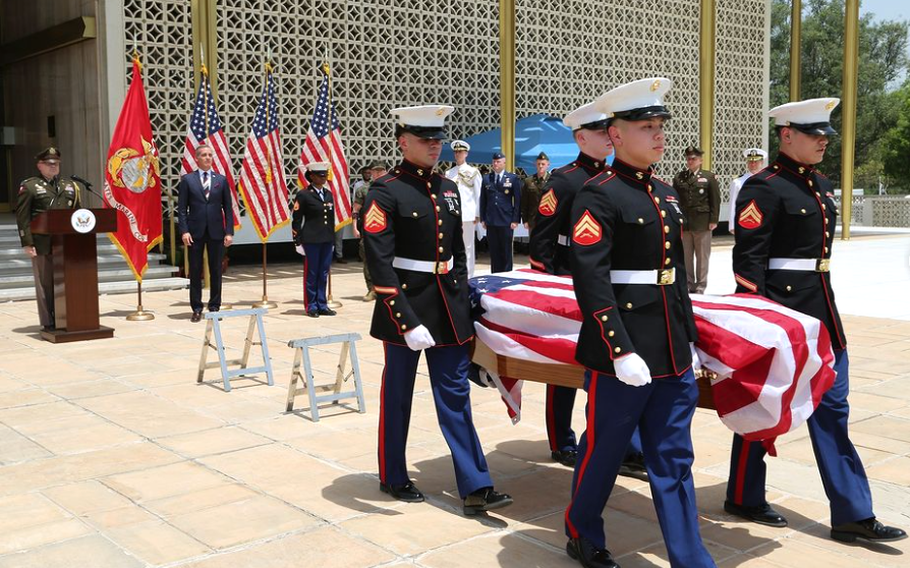
A Marine security detachment provides an honor guard during a sendoff ceremony for the remains of Marine Corps Maj. Gen. Harry K. Pickett at the U.S. Embassy in New Delhi, India, on Tuesday, May 23, 2023. (U.S. Marine Corps )
WASHINGTON — The remains of an American general who fought in World War I and World War II during his 33 years in the Marine Corps were finally returned to the United States, nearly 60 years after he died in India.
Maj. Gen. Harry Kleinbeck Pickett, a recipient of the Legion of Merit award for his actions during the attack on Pearl Harbor, died of a heart attack on vacation in 1965 and his remains were buried there until just recently when a relative, some helpers and government officials of both countries worked to return them to his home country.
“Maj. Gen. Pickett’s family and the U.S. government have been closely coordinating with Indian counterparts to return his remains to the United States,” the U.S. Consulate General Kolkata said in a statement.
Bob Mebane, a retired Army Nurse Corps officer who worked for years to help Pickett’s family get the remains to the United States, said it was a lengthy process due to the uncertainty of the grave’s location, obtaining the necessary permits and getting the time-consuming government approvals in India.
“Because it was not practical to preserve the body and have it shipped back to the U.S., he was buried at the Singtom British Cemetery outside of [Darjeeling],” he said. “At some point, his widow had a headstone placed on the grave, but it was stolen long ago, so he’d lain in an unmarked plot.”
Like Pickett, Mebane was a graduate of The Citadel in South Carolina and began studying him when he learned the general also attended the military college. Eventually, he got into contact with Pickett’s granddaughter while doing research and trying to find out where the general was buried. Several years ago, the two started working toward bringing back Pickett’s remains from India and having them buried at Arlington National Cemetery near Washington. One thing that helped, Mebane said, was the granddaughter had a map of the grave’s location in far northeastern India.
Marine Maj. Gen. Harry Pickett, pictured here in a 1942 photo, fought in World War I and World War II and was honored with the Legion of Merit award for “exceptionally meritorious conduct.” (U.S. Marine Corps)
After several years of dead ends, the two contacted another Citadel graduate who had become an attaché at the U.S. Embassy in New Delhi. With that person’s help, a mortuary service was found to “navigate a lengthy path of permits and bureaucratic approvals to enable the recovery,” Mebane said. U.S. officials also helped locate Pickett’s grave.
Pickett’s remains were finally recovered from his Darjeeling grave in February and sent to the United States last week following a sendoff ceremony at the embassy.
“Gen. Pickett wasn’t just a great man. He was a great Marine,” U.S. Ambassador to India Eric Garcetti said during the ceremony. “Thanks to the continued friendship, the warm bonds between America and India, his remains will now be reinterred with the greatest at Arlington National Cemetery. May the memories of our men and women in uniform who gave the ultimate sacrifice always be remembered.”
Born in Ridgeway, S.C., in 1888, Pickett joined the Marines when he was 25 and served on Guam, where in 1917, he participated in the capture of the German boat SMS Cormoran just after the U.S. entered World War I. For the next several years, he was part of various deployments in the U.S. and the Caribbean.
Years later, Pickett was the commanding officer at the Marine barracks in Pearl Harbor, Hawaii, on Dec. 7, 1941, when about 350 Japanese planes launched a surprise attack on the naval base — an act of “infamy,” according to then-President Franklin D. Roosevelt, that would push the U.S. into World War II. During the attack, Pickett and his Marines fired on the Japanese planes with small arms, according to The Citadel.
It was for his heroism during this time that Pickett was awarded the Legion of Merit, a military-wide honor given for “exceptionally meritorious conduct,” according to the Marine Corps awards manual. He was given the honor with a gold star device, which is specific to the Navy and Marine Corps.
For the rest of his military career, Pickett was in the United States preparing Marine forces on the West Coast for the fight in the Pacific Theater. He retired in 1946 with a final rank of major general. Nearly 20 years later, Pickett was on vacation in West Bengal in India when he suffered his fatal heart attack.
Pickett’s remains will be reinterred at Arlington National Cemetery in July.